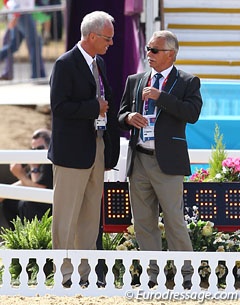
The FEI Dressage Committee held an in-person meeting with its committee members on 13 - 14 August 2012 in London, Great Britain. The most important discussions involved raising the number of horses allowed in Olympic dressage, the return to the old Grand Prix Special, professionalizing the judging panel, as well as re-defining the blood rule for dressage.
The format of the Asian Games had not yet been decided according to FEI Dressage Director Trond Asmyr (DD), but would be discussed during the General Assembly in November in the Group meeting.
Chair Frank Kemperman asked about the status of the Young Riders World Cup Final 2012. Asmyrexplained that it had been opened up to new bids as Frankfurt had turned down organising it this year. The chair proposed organising it together with the senior World Cup Final, to which all agreed it was a good idea.
Asmyr brought up the length of Term of the DC Members to discussion, as the Para- Equestrian committee had made a statement on this issue, that one period was too short for TC members. The Rules currently state one period of 4 years for the Members and two consecutive periods of 4 years for the Chair. In everyone’s experience it takes several years for the members to get fully into the Committee work and be able to contribute their best. The Para-Equestrian Dressage Committee at their meeting had also expressed that a maximum of two periods should be the norm for the members as well in order not to lose valuable experience. The DD therefore wanted the opinion of the DC as well.
The Chair pointed out that the terms had to be the same for all disciplines. A member could also come back into the Committee after one term away. After discussion, the DC agreed on one four year term, with a possible extension of two more years (especially if the Member was in the middle of a particular project).
Format and Qualification Process of the 2016 Olympic Games
The Chair inquired what the FEI Secretary General was expecting from the DC to present at the Sports Forum (date and venue not yet set), as Olympic qualification had been mentioned as the main issue for all three disciplines. The DD was to find this out.
Currently the number of horses was 75 each for Jumping and Eventing and 50 for Dressage, the IOC limiting the total number to 200. The DC unanimously agreed to ask for an increase for Dressage to 60 horses, due to the excellent results and high standard (all combinations, except one eliminated exceeding the qualification limit of 64%) of the Sport at the London Games, and following the huge popularity of the sport (totally sold out). Dressage is also very global, having the largest number of countries participating of the equestrian sports.
Concerning the format, a first draft paper to be discussed with the Stakeholders was to be made. The draws and format would be looked into further.
The DC appointed Maja Stukelk (SLO) as Technical Delegate for the 2013 World Cup Final in Gothenburg and Freddy Leyman (BEL) as TD for the 2014 Asian Games and 2015 Pan Am Games.
Revision of Senior Tests for 2013, incl. Decision on future Test for GPS
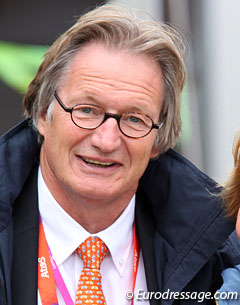 A working group had been formed to do revise the Senior tests. It should be concluded by the end of 2012 if something needed to be changed, then work would need to start in the beginning of 2013, the tests tried out, approved and then sent to the NFs in September.
A working group had been formed to do revise the Senior tests. It should be concluded by the end of 2012 if something needed to be changed, then work would need to start in the beginning of 2013, the tests tried out, approved and then sent to the NFs in September.
The group appointed had been Katrina Wüst, David Hunt and Kyra Kyrklund .The group was to look at the tests in general and present their thoughts on them to the DC. If any changes were to be made, they would come into force 01.01.2014 (no changes for 2013)
Concerning the Olympic Grand Prix Special, the DD stated that the majority of stakeholders wanted to change back to the previous Grand
Prix Special test, and this could be in force again from 01.01.2013. The working group was also to look into the Grand Prix Special test, if a different shorter version could be made, as this would be needed again for the 2016 OGs.
Decision: the Olympic Grand Prix Special will be mandatory for 2012. From 01.01.13 the former Grand Prix Special will be mandatory.
Nations Cup
The Dressage Committee would propose to the FEI Bureau that a Nations Cup was to be started in 2013 and the series was to include all CDIOs in the Calendar before 1.10.12 except Wellington due to the clash with the World Cup season.
Procedure and Level of the Pan Am Games 2015
The Chair introduced the proposal paper dated 12 July 2012 by Thomas Baur and Maribel Alonso. This matter had been discussed with Group 5 and would be discussed with Groups 6 and 4, with many different opinions aired.
The idea is to have combined teams (small and big tour) for 2015, with the long term goal (no deadline, but for the DC ideally in 2019) of as soon as possible running the Pan Am Games on Grand Prix level. For this proposal to go through, a positive feedback was needed from the PAEC meeting at the GA in Istanbul in November, after which it could be presented to the FEI Bureau.
The 2011 Pan Am Games had 47 horses in Dressage (out of a total of 130 in all disciplines). For 2015, the quota for Dressage was 40 horses, so minimum eligibility standards were needed.
Team Scores: A bonus system would need to be put in place to even out the differences between scored from the small and big tours.
Individual Scores: The final individual result was both individual tests combined.
Decision: The proposed formula for the 2015 Pan Am Games, with the updates made by the DC, was to be tested at CDIO Wellington in 2013 and then adjusted as needed afterwards.
Reasons for Elimination - Blood
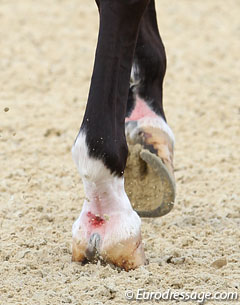 The Chair introduced the subject with the table showing the rules of all other disciplines regarding elimination for blood/bleeding. All other disciplines have some regulations in their rules on this matter except dressage, and a proposal for a regulation for Dressage needed to be decided on.
The Chair introduced the subject with the table showing the rules of all other disciplines regarding elimination for blood/bleeding. All other disciplines have some regulations in their rules on this matter except dressage, and a proposal for a regulation for Dressage needed to be decided on.
The DC discussed several possibilities and scenarios in detail. All agreed that a horse bleeding in the arena had to be stopped from continuing in the competition.
The groom/rider would notice if there was any blood on the horse in the warm-up arena. However, the Steward must check the horse before it enters the arena to ensure there is no blood anywhere. This requirement should be added to the Stewards Manual. A horse bleeding at any time must be checked by an FEI Veterinarian as a welfare measure, even if no re-start is possible.
Decision: In the arena, if the Judge at C suspects fresh blood/bleeding anywhere on the horse, he will stop the test and check. If the horse is bleeding or shows fresh blood, it is eliminated, and should be checked by an FEI Veterinarian. If the Judge thorough examination clarifies that the horse has no fresh blood/is not bleeding, the horse may resume and finish its test.
If the horse is injured and starts bleeding after finishing the test, it should be seen by an FEI Veterinarian to determine if it is fit to continue in the Event the following day(s).
The DC decided that no re-start is possible after an FEI Veterinarian has examined the horse due to the consequence for the format/timetable and the requirement for a level playing field. This proposal will be discussed first with the Legal and Veterinary Departments before a rule proposal is drafted.
Development in Dressage
The Chair welcomed Jacqueline Braissant, the Director of FEI Solidarity, as a guest to the meeting..
Jacqueline Braissant explained that FEI Solidarity was the new structure for Development at the FEI and was inspired from the Olympic Solidarity structure of four pillars, i.e. the Athlete, the Coach, the NFs and the Values. Assistance is given to all Pillars in the form of technical assistance, consulting and grants (financial assistance).
Jacqueline further commented that she was also been in charge of the FEI World Jumping & Dressage Challenges (WCHA-S/WCHA-D) at the FEI for 20 years. In terms of Development, she pointed out that the FEI created in 2003/2004 a Coach Education system of 4 levels and which is ongoing training for coaches rather than formal education. This programme has made a difference in developing NFs where it is applied especially in Jumping and Eventing. The FEI Coach Education system is based on the International Sports Coaching Framework (copy of framework to be distributed to the DC) recognized by the IOC.
DD mentioned that according to the decision of the FEI Bureau in June 2012, a review of the FEI World Dressage Challenge and a proposal for a new formula would have to be presented at the Sports Forum in April 2013, then go to the Bureau in May-June 2013 and then to the GA in November 2013 for implementation in 2014. The Challenge Series would still run in 2013 under its current form. Should the IOC approve a tailor-made programme for Dressage, it could start in 2013 already as pilot projects.
After a long and detailed discussion, the Chair concluded that the next steps would thus include a strategic paper for the global development of Dressage including the tailor-made development programme and a new FEI competition structure starting below PSG level. The 2013 Challenge would go on in parallel. The FEI Solidarity fund could complete the IOC funding received in 2013 if necessary. A realistic budget would be needed to be presented for approval by the FEI Solidarity Committee. The pay for the Solidarity Officers may need revising.
Decision: Trying out a new system for development was to be tested (tailor-made programme), to possibly replace the current FEI World Dressage Challenge. Funding would be applied for from the IOC for the quadrennial 2013-2016. Project to be ready by end September. Jacqueline, Elisabet and the DD were to work on this concept. The tailor-made programme would be run by FEI Solidarity after approval by the FEI Solidarity Committee. Thomas was to work on tests, based on the Advanced & Medium FEI World Dressage Challenge tests, for a possible new category of CDI, less than 1*.
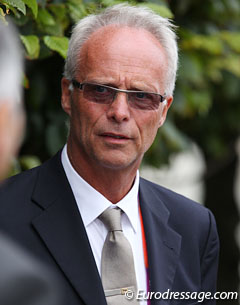 The Chair thanked Jacqueline and continued to discuss the future vision of Dressage and the possible need for a long term plan. Elisabet suggested an open Forum in connection with an event to discuss and have input from all different Stakeholder groups. The current popularity of Dressage should be used to build on for the future. The Global Forum could possibly be used for this also. The Chair asked all to write down a number of key words regarding their vision of what would be important for the future of Dressage.
The Chair thanked Jacqueline and continued to discuss the future vision of Dressage and the possible need for a long term plan. Elisabet suggested an open Forum in connection with an event to discuss and have input from all different Stakeholder groups. The current popularity of Dressage should be used to build on for the future. The Global Forum could possibly be used for this also. The Chair asked all to write down a number of key words regarding their vision of what would be important for the future of Dressage.
Judging Issues
a. Professional/Semi-Professional Judges
The Chair stated that professional judging had been one of the long term goals in the Action plan and needed to be looked into to decide how to go forward.
Thomas had made a first draft paper and introduced the subject saying the opinion of the DC was needed to see if this was an issue at all or if the current judges system should be continued.
The DD proposed to concentrate on the judges education system that has recently been started. With the JSP there is now good overview of the situation in the world, there is a talent bank, a new educations system and the list of judges was to be overhauled at the end of 2012, with judges not fulfilling criteria removed.
Kyra proposed looking at the system of judging instead and improving that. The half marks and 7 judges have been somewhat helpful, but issues still remain.
The Chair agreed that the quality of judging could be better and that education was the key word. If a professional system would help, it has to be investigated if it could be possible.
Decision: Professional/semi-professional judging could be an issue for the long-term future. A small working group was to be formed to look further into this, formed by Thomas, Anne Gribbons, Stephen Clarke, and Wim Ernes.
b. Education
The problem with the Courses/Seminars so far had not been the number of them, which had been sufficient, but being unable to establish the course calendar early enough (ideally one year in advance), as organisers had mostly come in late. The FEI would need to be more proactive and approaching organisers.
At the end of 2012, the new Education system will have been in use 3 years, and the first review of the judges list was due. An estimated number of 20-40 judges would be taken out for not fulfilling the criteria. The judges had been informed and reminded about this.
Regarding the fast track procedure, the DC previously concluded that this had to take place in the NFs. The DD was to take this up with Harald Müller, who had collected information in this regard.
The e-learning programme was going ahead; a first test programme was being worked on and had been financed. It would then be evaluated, and the real programme then worked on. A working group was in place for this.
c. Other Issues
From 1st January 2013, according to a new rule approved by the GA, organisers would only be allowed to use the same Judges from other countries for a maximum of 3 years in a row. Therefore, if a judge had officiated at a show in 2010, -11 and -12, he could not be invited for 2013.
The Chair brought up the JSP, now consisting of Henk van Bergen, Eric Lette, David Hunt and Dieter Schüle, Jan Peeters no longer being a JSP member. One more judge would be needed.
Decision: Another Judge member of the JSP was to be appointed.
Decision: Information would be sent out to the NFs that no more exceptions for 3 home
judges at CDIs3* would be granted from 01 January 2013.
Thomas remarked that the statement in Annex 12 of the rules, that one 3* judge should be allowed and invited to CDIs3* should be changed into 1-2 3* judges, to provide them with more judging opportunities.
d. Judging system
The Chair called for an analysis about the effects of the new judges regulations (7 Judges, half marks and JSP).
Procedure of Testing and Approving new Equipment
The DD informed the DC that there had been a number of issues surrounding the approval of new equipment. The DC felt that the FEI should have the full authority to decide whether or not to approve equipment.
A system with a testing panel was in place since several years, so new equipment could be given to them to test and give feedback to the DC who would then decide. Too much new equipment was not wanted.
Kyra stated that the testers had to be totally neutral and not in any way connected to any manufacturer. The manufacturer should provide the goods to be tested through the FEI so they would not know who the testers were. A job description outlining confidentiality should be written.
Decision: Kyra was to come with a proposal of 5 names for the testing panel for 2013, until further notice. HQ will draft an updated job description
Action List 2013-14
The Chair reminded that the DC needed to think what issues were important to do in the next years. This year the quality of judging had been a main issue, and it was to be on the list again along with education and evaluation of the new system.
The successful Olympic Games should be used to promote Dressage. A Nations Cup series should be introduced from 2013. Development was an ongoing issue, now having a first report and proposal, practical work should be started.
The Chair invited the DC to send in further proposals for issues to work on in the coming years. Decision: The DD was to make a list and send out to the DC.
First Evaluation of the Olympic Games 2012
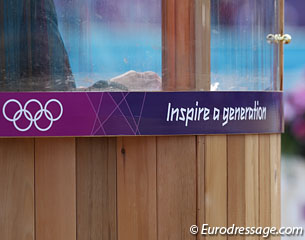 The Games had been a great success and perfectly organised. Only small details were to be discussed.
The Games had been a great success and perfectly organised. Only small details were to be discussed.
The Steward General had proposed that all practice arenas should be filmed. This was seen as a good idea, both as protection for the athletes and for the sport, and was to be looked into.
Decision: The DD was to contact Jacques van Daele and Elisabeth Williams and ask them to work together on a proposal for an updated Stewards Manual.
Overall, the Games were exceptionally well organised, both the venue and all details. The DD had talked to most athletes, who also had been very happy. The way they answered questions at the press conferences had also been very good for the sport.
Future of Dressage
The Chair asked for all the key words/issues the DC proposed for the future. The following were mentioned:
- The profile of Dressage – the way dressage is presented/ »sold » to the world F.e.
- Review the dress code – is it old fashioned?
- Handling of the Horses - Welfare
This covers also horse inspections, prize giving ceremonies, the way the horses are presented, transportation, overall life of a Dressage horse, both from a critical and promotional point of view.
Improve the horse inspection. Possibly have two horse inspections, if misbehave get sent out and can come back the next day, if still misbehaves the horse does not get to compete. Presentation should be better all round. Chains and whips should be allowed automatically for security reasons (Riders Club to come with rules proposal) - Is the actual format the best for the next 10 years (programme, tests, way of judging and competing)?
- Aiming to make judging as understandable and transparent as possible
- Make the sport more attractive and transparent and sell it better (information to audience), also (open scoring / explanation)
- recognising much has already been done to reach more transparency (e.g. tests and marks on the internet)
- Improving judging of especially the Freestyle (clarifying and developing the concept of degree of difficulty, look to other sports)
- Use social media to our advantage
- “Inspire the next generation”
- interest of young fans to be encouraged
- Interest more media (not only the equestrian media)
- Make stars (riders & horses) (e.g. Anky as what her being a star did for the sport in NED, Totilas hype in Germany).
Related Links
FEI Dressage Committee Minutes of 20 June 2012
Blood Rule Withdrawn, Nomination Dressage Committee Rider Rep Postponed
Germany Has a Change of Heart and Says No to Blood Rule
Germany In Favour of Blood Rule, Austrian Demands More Fairness
FEI Guidelines: Regulatory Explanation for Eliminating Horses with Blood
Dressage to Become a Blood Sport?!